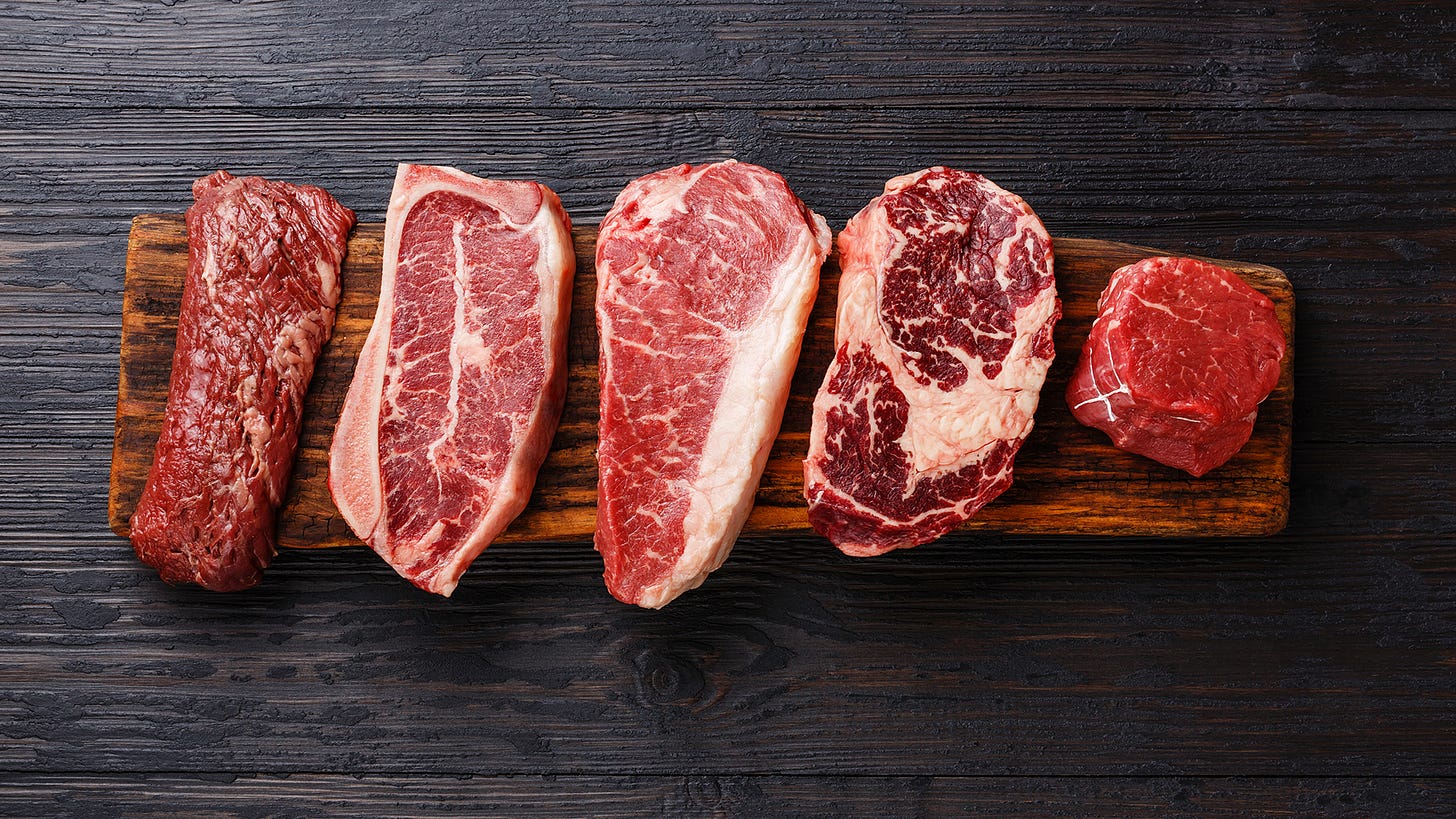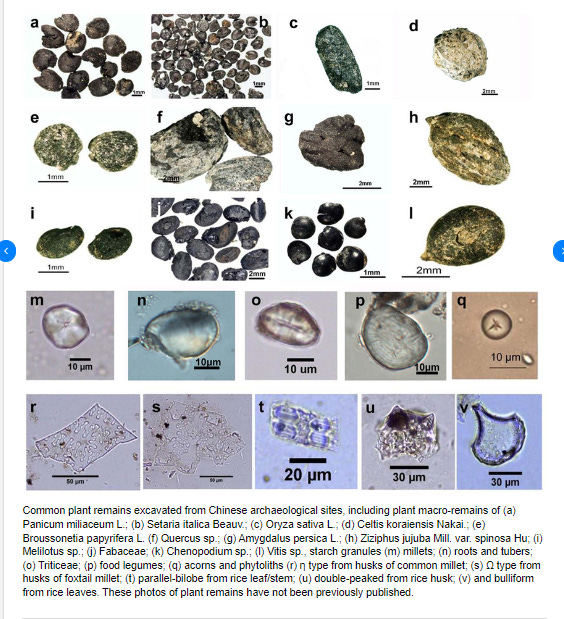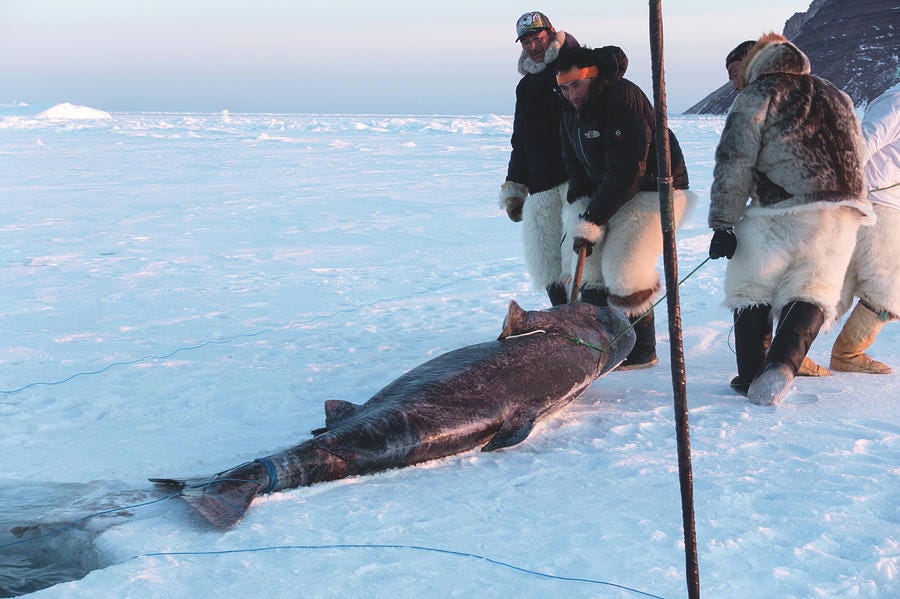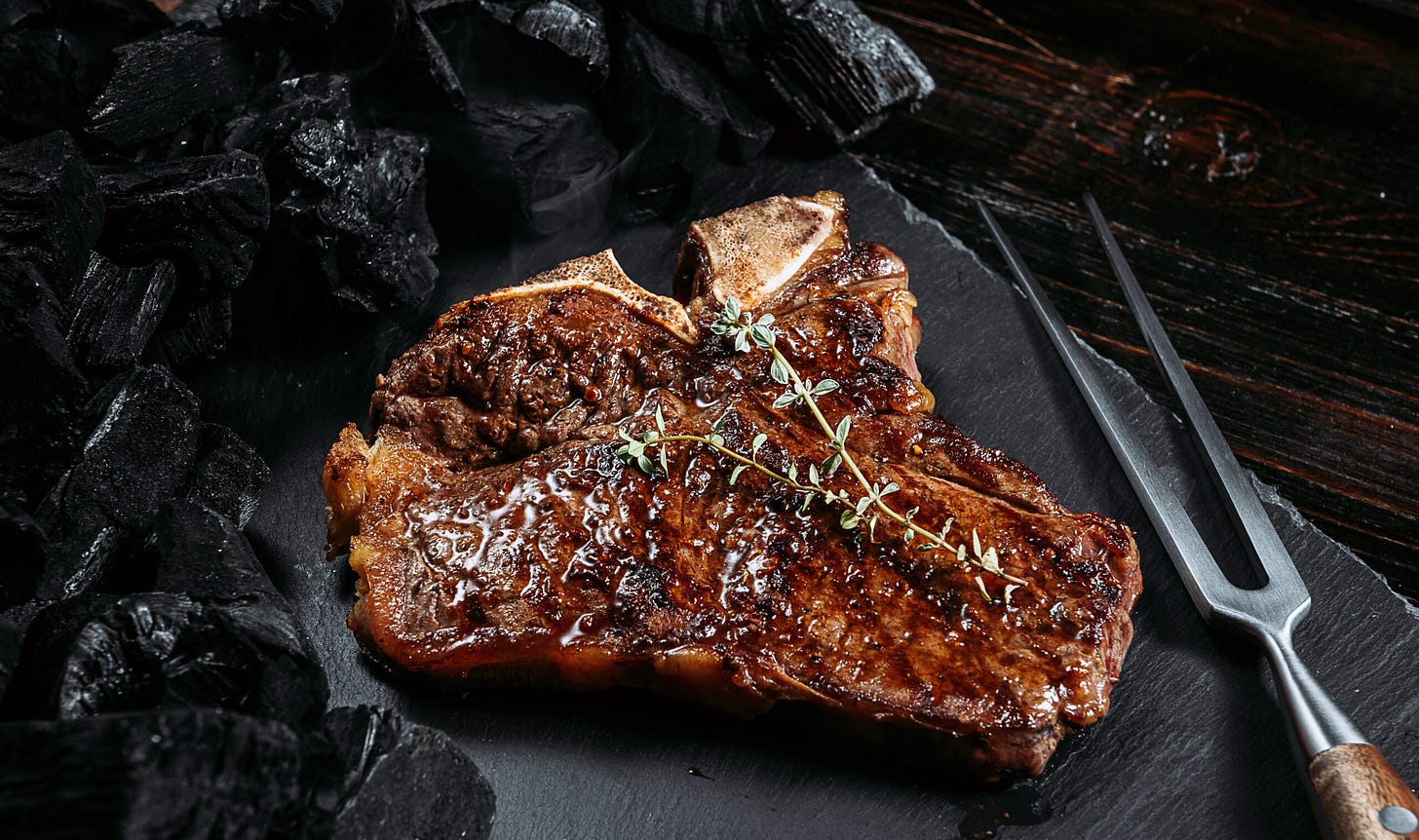The all-meat diet is the shiniest fad on the block. But despite its trendy appeal, it lacks a solid nutritional foundation. While there are many positive testimonials and impressive transformations associated with this diet, it's important to consider its highly restrictive nature and the lack of research on its long-term effects.
There is no official definition, but followers advocate eating red meat, pork, chicken and other poultry, eggs, fish and seafood. Some low-lactose dairy can be included, such as cheese and yoghurt. All plant foods are typically excluded. So no fruit, vegetables, legumes, grains or nuts and seeds.
The carnivore diet, also known as the zero-carb diet, isn't a novel concept. Its roots can be traced back to various historical figures and movements. An early documented example is Bernard Moncriff, a German writer who in 1856 published "The Philosophy of the Stomach: Or, An Exclusively Animal Diet," recounting his year-long experiment of subsisting solely on beef and milk. Several others have notably followed suit, often experimenting with the diet for health or medical reasons.
That last point is important because millions today suffer through severe illnesses or diseases. These scourges of modern society are firmly rooted in our uncanny ability to root out vital nutrients from foods, while injecting every abominable chemical and substance known to man.
So of course many are looking for a “new, shiny health penny” to cure them, with the argument that the standard whole food diet is unhealthy. No it isn’t. It’s individual choice that led to downfall.
Pizza, bagels and burgers don’t just jump into our mouth; we make the choice to eat unhealthy foods time and again. Therefore disease, the end result, isn’t about overt whole food consumption, it’s about lack of self control from substandard fare. Why should a new, radical and less nutritious dietary attempt then work, when the initial, easier and more nutritious approach failed?
Ancestorial Carnivores?
The idea of all meat eating is based on the notion that our ancestors ate limited amounts of carbs and consumed a diet primarily composed of meat instead; a theory that lacks substance. While meat was undoubtedly an important part of the diet for many hunter-gatherer groups, the evidence suggests that their diet was far more diverse and varied depending on the environment and resources available. This can be proven through several means:
Archaeological Evidence:
Plant Remains: Archaeological sites often contain evidence of plant food processing tools, charred seeds, and other plant remains, indicating a significant consumption of plant-based foods alongside meat.
Dental Microwear: Analysis of tooth wear patterns in ancient human remains suggests a diet that included both tough and abrasive foods (like meat) and softer, more fibrous foods (like plants).
Anthropological Studies: Studies of contemporary hunter-gatherer groups show a wide range of dietary patterns, with some relying heavily on meat while others consume a significant portion of plant-based foods.
Nutritional Needs: A purely meat-based diet would be deficient in essential nutrients crucial for human health. That’s a problem because there’s no health food stores supplying supplements at the time, nor knowledge of what may be missing in diet. While tongue in cheek, this certainly suggests that early humans likely supplemented their diet with various plant-based foods to meet their nutritional needs.
Digestive System: The human digestive system, with its long intestines and ability to ferment fiber, is more suited to a mixed diet of plants and animals than a purely carnivorous one.
Genetic Adaptations: Human can efficiently digest both meat and plants. There is no strong genetic evidence suggesting a sole reliance on a meat-based diet is necessary.
Regional and Seasonal Variations: The availability of plant and animal resources varied greatly depending on the environment and season. Early humans likely adapted their diet to their surroundings, consuming more meat in some seasons and more plants in others.
While there's lots of physical evidence to suggest that our ancestors consumed meat, the claim that their diet was exclusively or primarily meat-based is an oversimplification.
Other Societies
The Inuit of the Canadian Arctic thrive on fish, seal, walrus and whale meat. Others, such as the Chukotka of the Russian Arctic, the Masai, Samburu, and Rendille warriors of East Africa, the steppe nomads of Mongolia, the Sioux of South Dakota and the Brazilian Gauchos are also said to eat mainly meat.
Interestingly, there are facts left unstated. For example, the Inuit and Yupik people survive on a diet that is far more in-depth than any city dwelling attempt at meat eating. For example, they eat:
Nutrient-dense meat, including fish, seal, whale, caribou, and other game animals that provide protein, fat, and essential vitamins and minerals.
Organ meats like liver, heart, and kidneys, which are exceptionally rich in nutrients like vitamin A, vitamin C, D, E, K2, and B vitamins. They also contain the minerals iron, copper, zinc, selenium, copper, magnesium, CoQ10 and a variety of trace minerals.
Fermented foods like igunaq (fermented walrus meat) and kiviak (fermented birds) providing probiotics and vitamin C, seasonal berries and plants, seaweed and kelp (iodine and other trace minerals) and some food raw, such as muktuk (whale skin and blubber), providing a good source of vitamin C.
The other societies probably had other types of nutrient dense meats/foods. While I wouldn't recommend consuming all such meats, it's worth considering how difficult it can be to find such variety in most supermarkets or even local farms. The majority of meat available in these places is often raised with chemicals, and few people go to the lengths necessary to source such a diverse selection to ensure optimal nutrient intake.
Are There Nutritional Benefits?

If you’re going to start a new diet, you should always examine the science behind it; the proof that it’s nutritious. To be clear, there is no carnivore diet science. Instead, it presents non-specific medical research, while completely overlooking the body’s essential nutrition needs.
In essence, you throw out fruit, vegetables, grains, starches, nuts, and legumes, because the carnivore diet dictates that you can only eat meat, animal fat, and eggs.
This diet, like others, blames all our health problems on certain whole food groups and completely eliminates them, while conveniently ignoring the role of junk food. Meanwhile, evidence supporting the all-meat diet is mainly anecdotal; from individual positive personal experiences, not scientific data.
While a recent study indicated self-reported health benefits and high satisfaction among long-term carnivore diet followers, its findings are limited due to the inherent bias of asking people to evaluate a diet they willingly adopted.
Research tells us that consumption of protein above safe upper limits, or over a long period of time (six months or more) could impair the ability of the liver, intestine and kidneys to detoxify ammonia, which is the waste product made by our body during the digestion of protein.
While one person may be able to sustain a carnivore diet for months, or even years, without any health complications, that’s certainly not going to be the case for everyone.
Lean red meat is certainly a good source of iron, zinc, selenium, phosphorous and vitamin B6, B12, Vitamin D, K and essential fatty acids. But unless extremely careful, this diet will lack sufficient vitamin C and folate, certain B vitamins, antioxidants, potassium, magnesium, and a variety of phytonutrients and fiber.
Benefits of “All Meat” Eating?
An all-meat diet may seem restrictive, but proponents of the carnivore diet say they have various strategies to mitigate potential nutritional deficiencies:
Nose-to-Tail Eating: This involves consuming various animal parts beyond muscle meat, including organ meats like liver, kidney, heart, and bone marrow. While nutrient dense, few will have the stomach to delve deep into this approach.
Bone Broth: Made by simmering animal bones and connective tissue, extracting minerals like calcium, magnesium, and phosphorus. It's also a source of collagen, a protein crucial for joint health and skin elasticity.
Fermented Foods: Some proponents of the carnivore diet include fermented dairy products like yogurt and kefir, which can provide probiotics and vitamin K2.
Salt: Provides essential sodium and chloride and can help maintain electrolyte balance and prevent dehydration.
Targeted Supplementation: Some on the carnivore diet take specific supplements to address potential deficiencies.
Individual Adjustments: People may experiment with different types of meat and animal products to ensure a diverse nutrient intake. This includes eggs, dairy, or even certain seafood to broaden their nutritional profile.
Monitoring and Testing: Regular blood tests can help monitor nutrient levels and identify potential deficiencies early on.
While these strategies can help reduce the risk of deficiencies, it's important to note that this type of eating is so restrictive that only a few will adhere to it. Also, mess up and the long-term safety and efficacy of the carnivore diet becomes a concern.
Dr Axe says that currently, no research has been conducted to evaluate distant effects of the carnivore diet. Therefore, it’s difficult to determine how much of a long-term impact eating only meat and eggs may have on your health.
Meat Is Good
I just want to end by saying that I am not against the consumption of meat. I believe properly raised meat is good to eat and extremely healthy—but within moderation and alongside other whole foods grown in healthy ways.
As well, you may be at wits end with a nasty ailment, where nothing else seems to have worked. As such, this may be a time to try the “all meat” diet. But in general, any extreme ways of eating are eventually shunted aside by most who try them, as this quote from the New Yorker explains:
Fad diets are perfectly manufactured to spread. They appeal to dissatisfaction. They provide crude explanations for why things are going wrong. And they tap into an intuitive logic—that the greater the sacrifice, the greater the redemption. Yet fad diets also doom themselves. The same features that fuel their popularity—their quick-fix nature, their severe and often harmful restrictions—are what make them unsustainable for many.
You even see this happening within the culture of carnivory. When the podcaster Joe Rogan went on a carnivore diet, in 2022, he ate fruit with his meat. The Liver King espouses a “nutrient-dense, nose-to-tail diet” while openly consuming potatoes and maple syrup. Yet the most dramatic turnabout occurred with Paul Saladino. Since publishing “The Carnivore Code,” he has acknowledged the benefits of carbohydrates. He now incorporates fruit, honey, and kefir into his daily fare, and this spring he changed his social-media handles from versions of @CarnivoreMD to @PaulSaladinoMD. In true Paleolithic fashion, even meatfluencers struggle to resist the pull of plants.
Your presence here is greatly valued. If you've found the content interesting and useful, please consider supporting it through a paid subscription. While all our resources are freely available, your subscription plays a vital role. It helps in covering some of the operational costs and supports the continuation of this independent, unbiased research and journalism work. Please make full use of our free library.








